(Continued below from Brazil I)
In 1865 at the end of the American Civil War a substantial number of Southerners left the South; many moved to other parts of the United States, such as the American West, but a few left the country entirely. The most popular country of Southerner’s emigration was Brazil. The following includes extracts from the wife of Dr. Robert Norris on the expedition to Brazil from Alabama.
SOUTHERN IMMIGRATION TO BRAZIL
PART II
(Excerpts transcribed from the article written by Peter A. Brannon in The Alabama Historical Quarterly Summer -1930)
Extracts from Mrs. Norris’ letter are: “H. F. Steagall from Texas was my father. We arrived here in May 1868,” when I was 18 years old. I was afterward married to Dr. Robert Norrisi of Alabama, a graduate of Mobile Medical College. (Note: His father was William Hutchinson Norris, the original settler, an Alabama State Senator and a Grand Master of Freemasons of Alabama).
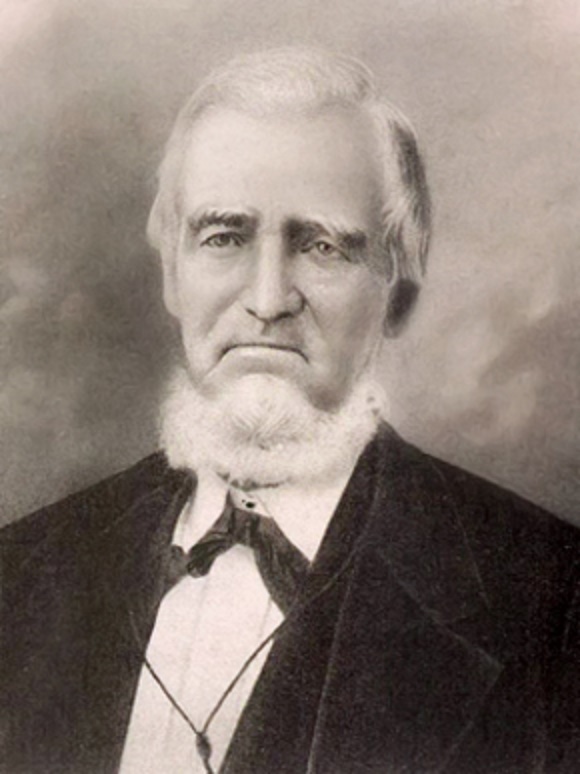 William Hutchinson Norris – original settler and former state senator from Alabama moved to Brazil. He was also Grand Master of the Freemasons of Alabama from 1861-1862 and his biography and genealogy is in The Grand Masters of Free & Accepted Masons of the State of Alabama 1811-2011
William Hutchinson Norris – original settler and former state senator from Alabama moved to Brazil. He was also Grand Master of the Freemasons of Alabama from 1861-1862 and his biography and genealogy is in The Grand Masters of Free & Accepted Masons of the State of Alabama 1811-2011
“See the biographical data of the lives and backgrounds of all the Grand Masters of Freemasonry in Alabama from 1811 to 2011. Many early photographs of the Grand Masters are included in this work by Donna R. Causey”
I came over on a ship called the “Tartar”, an old blockade runner once called the “Wren”. She was bought by a man named Carlos Nathan and fashioned into an Emigrant Ship, a slow as well as an unsafe one, too. We were from the l11th of April until the 29th of May on the way, having fine weather all the time, and but for this it was said that we would have surely been lost, as the vessel had too much top hample to weather a storm.
It was loaded to the full with passengers from Texas, Louisiana, Mississippi, and Alabama.”
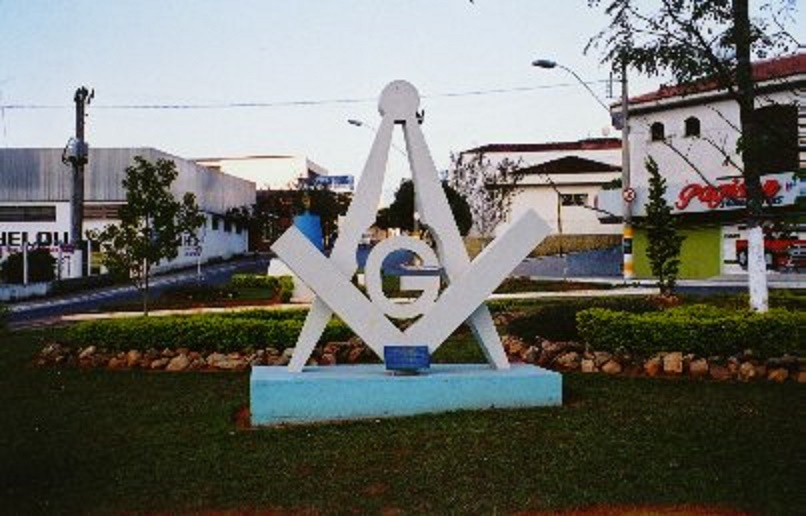 The entrance to Americana, a Brazilian city founded in 1865 by Confederate emigrants, most of them Freemasons, is marked by a large Square and Compasses monument with a descriptive plaque. See more at 154 Masonic Families Founded A City Of 170,000 In Brazil
The entrance to Americana, a Brazilian city founded in 1865 by Confederate emigrants, most of them Freemasons, is marked by a large Square and Compasses monument with a descriptive plaque. See more at 154 Masonic Families Founded A City Of 170,000 In Brazil
Settled around Caupinas, Santa Barbara
“Nearly all of the Alabamians who came here settled around Caupinas, Santa Barbara and what is now Villa Americana. This last was not so named until after the railroad was built to it being only no further than Judiahy for several years after we came here. Many of the Southerners besides the Alabamians settled in the above-named localities, and at one time there were 200 families around Santa Barbara alone, though not now. Some have returned to the United States, others have moved to other places in Brazil and one Protestant Cemetery counts many who have passed on.”
Again she says, “Few of the very earliest settlers are left though many of the descendants are yet living in Rio de Janeiro, in Sao Paulo and the larger cities.”
NOTE: Colonel William H. Norris had a small fortune in gold buried in his Perry County, Alabama, yard. A Union officer stopped his men from digging it up after Norris’s wife shook the officer’s hand Masonically. With that gold, Colonel Norris bought 500 acres and established an infant community. That spot in Brazil was to become the largest Confederate settlement in South America. It is near Santa Barbara, southeast of the city of Sao Paulo, Brazil.
….Norris and his Brethren founded George Washington Lodge in their little village that was soon named Americana by their neighbors. What began this exodus as a Masonic event in history? Actually, a Mason named Robert W. Lewis of Virginia wrote Robert E. Lee asking his opinion about Confederates leaving the country. Lee answered, “The South requires the presence of her sons…to sustain and restore her.” Then he wrote, “In answer to your question as to what portion I hold in the order of Masons, I have to reply that I am not a Mason and have never belonged to the society.”
….Lewis and other Masons knew Freemasonry was alive and well in Brazil, living hand-in-glove with its Protestant community, especially Presbyterians. Encouragement came from Brother Charles Nathan, a member of the Brazilian immigration society who helped arrange passage for Southerners via New Orleans. Nathan was a British merchant in Rio de Janeiro who had lived in New Orleans, Louisiana. He apparently worked with Reverend Ballard S. Bunn who led migrants to another colony near Americana.(154 Masonic Families Founded A City Of 170,000 In Brazil)
Businessmen were not fitted to be pioneers
While for many years after the return of the families to their former homes, in the Southern States, they refused to make comments, at the present time, the younger generation freely say that even though money was easy to make in Brazil, the conditions they hoped for were not realized.
Those people who left the South of the United States were not fitted to be pioneers in any country. It is not reasonable to assume that men accustomed to direct big policies and to handle progressive business firms could immediately fit themselves into those conditions which required the menial labor of clearing up forests, opening up of lands, the building of houses and altogether re-establishing themselves.
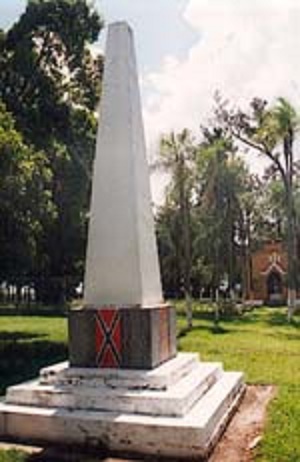 Confederado Monument with the surnames of the families and the Confederate flag in Cemitério dos Americanos
Confederado Monument with the surnames of the families and the Confederate flag in Cemitério dos Americanos
Nor can we assume that women who had adorned the ball-room floors and the parlors of aristocratic homes in North America would be happy under thatched roofs and in mud-daubed cabins, along the lake front in the forests of South America. Again, cotton might be raised in Southern Sao Paulo, but not successfully in the upper Rio Doce regions.
Many immigrants moved to the cities
True, ’tis, that many of those who went were typical “soldiers of fortune,” but the leaders who seem to have been successful in promoting “Colonies” to go South, were not always successful in keeping these groups together once they had reached there.
Land seems to have been cheap enough and had they understood the production of sugar cane, coffee, and those articles of commerce native to that country, they might have been content to stay. History records one outstanding fact, that most of those who stayed, very shortly found themselves unsatisfied with country life, and drifted into the cities. At the present time, the descendants of those original settlers are to be found in the cities and not on the estates.
Another fact brought out in an investigation of this study, is that of all those who left the United States, in most cases, the professional man was the one who was most content. As before claimed, the artisan: seems to have been that one most needed.
Dissatisfaction with claim assignments of the leaders who promoted the emigration, is ever apparent in present-day interviews with those who have knowledge of conditions there. The cleared land was probably most productive and tillable, but had the settlers been able to adapt themselves to conditions and to have subsisted until the allotment could have been utilized to start production, it is very evident that these lands, covered with great mahogany trees, would have been far more productive of a money return, than those open stretches.
Some people returned to America
The improvement of political conditions in the United States which began about 1870, either through an adaptation of the people to these conditions, or a positive determination on the part of the former leaders to right them, in my mind, influenced many to return. Economic conditions improved faster than the ones altogether governed by politics. It was possible for those who were dissatisfied with life in Brazil to return and take up their old work.
Longing for the old associations, many sacrificed and made the return. The undeveloped sections of Florida seem to have profited by Brazil’s loss. An examination of the personnel of certain communities in the central Appalachee country of Florida and along the west coast of the peninsula shows many families grouped there, who had become acquainted with one another in the Brazilian venture.
Complaints of misrepresentation of conditions
There are few instances of complaint on the part of those who left the United States for Brazil, toward the Government of Brazil, as. to misrepresentation of conditions or to failure to carry out the agreements made to induce them to come there. Apparently in the emigration parties went down on vessels chartered by the Empire but such was not the case in 1868.
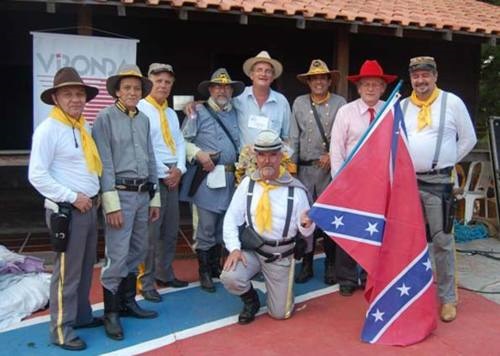 Confederates in Sao Paulo, Brazil
Confederates in Sao Paulo, Brazil
At the same time, it must be understood that even though these parties or groups of families went on vessels chartered by the Government, they were expected to pay their passage, but were given time to meet this obligation. In some cases the vessels were not what was expected by the emigrants, but accommodations appear to have been reasonably good. The steam-boat fare, as advertised in New York in 1873 was from that city to Para, $150.00, and to Rio de Janeiro, $225.00.
Facilitating transportation, and apparently encouraging emigration, a Steam Ship Company was organized in 1860 and this was in existence almost ten years later.
While the Emigration Agents appear to have sought a subsidized government control line between the Gulf Country and Brazil, there is no indication of their ever having presented the matter in a formal way.
Most traveled from New York City to Brazil
While some, notably the Hastings and Dunn Colonies, shipped from Mobile and New Orleans respectively, the records would indicate that most of the emigrants to Brazil went out from New York City. Certainly, all of them returned via that route.
Sao Paulo, Espirito Santo, Rio de Janeiro and the Rio Grande countries, seem to have been favored largely by those advance agents sent out early after the War. In a measure, we may surmise that the assumption was that this section was far enough North to grow cotton. The production of this staple does not seem to have materialized. Where emigrants were content to give attention to coffee and the natural products of the country, they appear to have succeeded. The records disclose only one effort in the Amazon country, that of Major Hastings.
His Reserve was a tract of unoccupied Government land on the South side of the Amazon River, and South of the River Tapajos, between these rivers and Curua. It was in the Province of Para and comprised about 96 square miles. According to the terms of the agreement with him, he was to make three equal payments, commencing at the end of the third year after the establishment of his colony on these lands.
Act of 1866 directed construction of cottages, road and Santarim
Illustrating the interest of the Government, by an Act approved December 1, 1866, 26,000 milreis was appropriated for the construction of cottages and a road from Santarim to the site of the Colony. The Act directed the erection of an infirmary and a house for the reception of colonists, this to be provided in Para. A similar situation was in Rio. The “Government House” (—c—cf Jennie’s Diary) at Rio, under Colonel Broome, was this provision.
Emigrants paid their own expenses
All prospective settlers in the South of the Empire, were landed at Rio and trans-shipped from there. Emigrants were allowed to pay their own expenses, that is, transportation, and might choose their locations. Those who received transportation and subsistence of the Government were required to settle where the prearranged agreement set out.
The Brazilian Government seems to have sanctioned, and apparently encouraged, a form of emigration agent who was permitted to charge each contemplated emigrant a registration fee of $5.00 per person. Mr. Hastings’ American representative was J. R. Edwards, of No. 8 South Commerce Street, Mobile, Alabama.
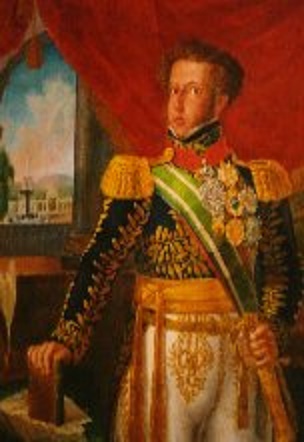 Dom Pedro II was Emperor of Brazil. He was a Freemason whose father was a Grand Master of Masons in Brazil
Dom Pedro II was Emperor of Brazil. He was a Freemason whose father was a Grand Master of Masons in Brazil
Mr. Hastings was not the first one to interest himself in the Amazon country for he found “Mr. Simpson from Alabama” an engineer, and “Mr. Collyer an American” there on his arrival in 1866. Mr. Simpson went with him, both being guests of the Government when he made his first inspection. Mr. Collyer, who had some Steam Ship Line affiliations, served as interpreter at this time. Mr. Hastings’ own journal indicates that he did not immediately secure the interest in his project which had manifested itself in the regions near Rio.
There was some fear that the country might fall into the hands of the United States
A characteristic statement is made that “on August 15, 1866, the opinion prevailed in Para, that the American emigrants to the Amazon Valley would over-rule that country as they did in California.” He commented that there seemed to be some fear that the country might fall into the hands of the United States. This surmise on the part of the Brazilians, may be probably justifiable when it is realized that the Americans had entered Texas and possessed themselves of that country, likewise, Arizona and California had been appropriated.
When it is realized that Major Hastings’ vigorous energy had been instrumental in the development of that condition on the Pacific Coast, those Brazilian students of politics may have had ground to fear a like result from his efforts at colonization on the Amazon. However, Emigrant Aid Associations soon began to be formed and Dr. Gama Abrue, President of the one at Para, is prominently identified with the stay of these former Americans in the Southern country.
Inspection of suitable sites for settlement
Although it cannot be definitely stated, there is no reason to believe that the “Reverend Dunn’s Colony,” subsequently referred to, (of Jennie’s Diary} included the Texans. Frank Mullen and William Bowen were in Rio in May 1866, having begun the inspection of suitable sites for settlement as early as January 9, previous. Colonel Demaret was also there quite early and Mrs. Norris lists the latter, as well as Colonel Bowen. These men must doubtless have been the influences which carried the settlers from that State to this country Jacob Humbird of Maryland, the “brain and energy” to whom Brazil was indebted for the completion of a large portion of Don Pedro Railroad, doubtless did not “emigrate” to Brazil. Dr. H. A. Shaw, a resident of Aiken County, South Carolina, published in December 1866, the first account of emigrants from that state.
Dr. Shaw was sent down by the Southern Colonization Society
Dr. Shaw’s contribution to the Advertiser, quoting the agents’ language, says: “The Brazilian Emigration Scheme is finally under way.” These agents submitted a circular signed by the United States and Brazil Steam Ship Company’s representative, Quintino Bocayuva, in which he sets out the advantages guaranteed to emigrants, beginning with the statement, “free passage to Emigrants to Brazil by the United States and Brazil Mail Steam Ship Company on the 22nd of each month. The steamer, “South America,” which left on the 22nd for Rio, took out 213 emigrants, presumably from South Carolina.
Col. W. H. Norris was one of the leading men of the Colony
While records establish the fact that many Americans had returned home prior to the appointment of Henry Clay Armstrong as the United States Consul General in Brazil, an interesting reflection of this old emigration is brought out in a newspaper reference of June 3, 1886, in which he says, “I found them (the Southerners) situated four hundred miles from Rio Janeiro in the back country. They have a tract about fifteen hundred miles square.
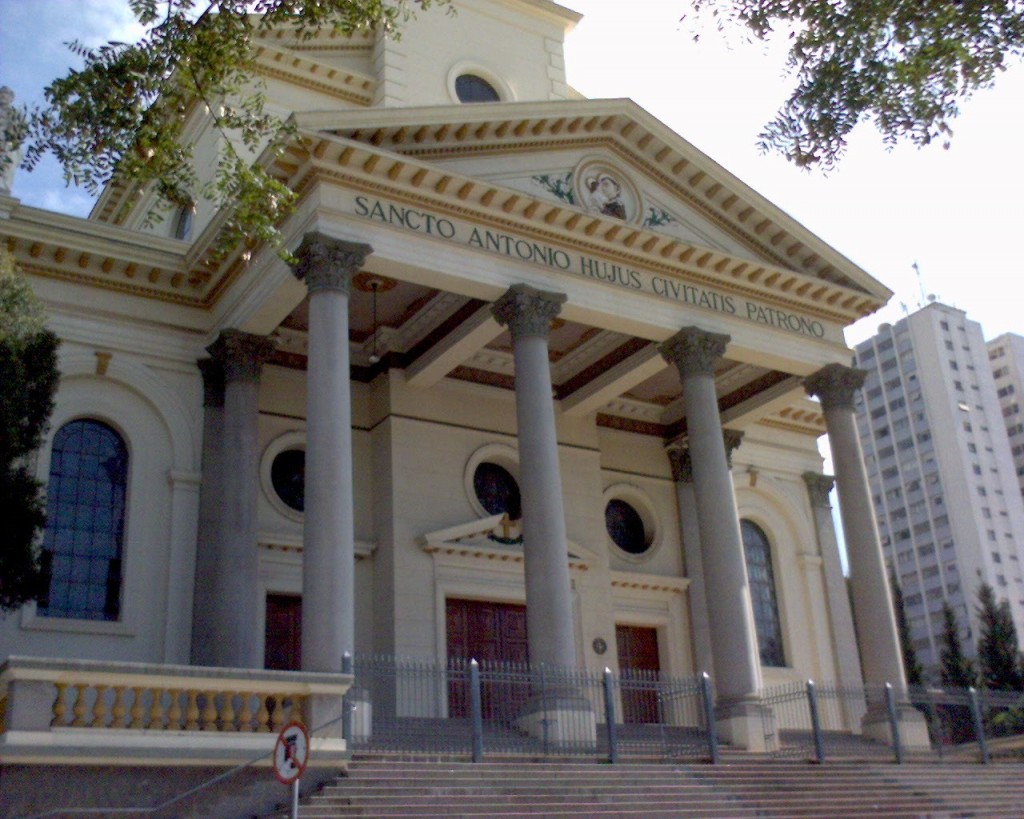 Americana in Brazilian state of São Paulo, Brazil
Americana in Brazilian state of São Paulo, Brazil
Col. W. H. Norris, who was quite a prominent man in Alabama, and who was at one time, a member of the General Assembly, is one of the leading men of the Colony. I also met Dr. C. C. Crisp’ a very accomplished man from Tennessee — They seemed quite well contented and said they would probably remain — They are engaged also in the production of cotton and this finds a ready market as the mills that have been started in the Empire prefer it to any other.”
Former Selma resident, Dr. Russell McCord his wife and three children resided North of Rio
Mrs. McCord, who died in Selma in June 1930, in her 96th year, widow of Dr. Russell McCord, a physician, was an early settler. The Doctor, his wife, and three children resided North of Rio, some distance in the country. He was employed by a wealthy plantation owner, a widow, and a close relative of the Emperor.
For most of their stay of 18 years, they lived in the family of the Countess and it cannot be said that their experiences were alike those of the other families who went down. Dr. McCord was Medical Officer for a large plantation, had a lucrative practice and good income. They returned to America only when his health failed. He passed away in 1885 is buried in Live Oak Cemetery in Dallas County, Alabama.
A diligent effort has been made to determine the interest of men from the whole Southern States in this project, and even though the statement was published that nineteen Emigration Societies had placed their affairs in the hands of General Wood of Mississippi, the writer has found most interest centered in South Carolina, Alabama, Louisiana and Texas. In so far as records are to be had, no great amount of interest appears on the part of Virginians and North Carolinians. As Tennesseans showed but minor concern, this question may yet have a deep bearing on the political issues of the Reconstruction Period. The slave holding states and men favorable to the holding of slaves, may, on a more thorough investigation of the subject, be found to have been the dominating influences in this theory.
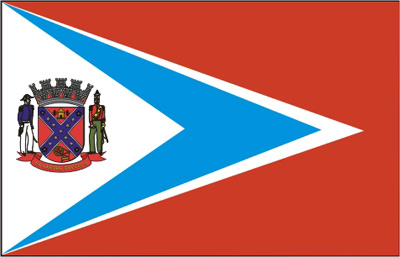 The old flag of Americana reflecting the city’s Confederate heritage
The old flag of Americana reflecting the city’s Confederate heritage
While no claim is made by the writer to have by any means made a final study of the subject, such suggestions as have been prompted by the personnel of those living in the Empire, have been followed in the effort to arrive at a thorough history of the movement. The subject is not treated from a political standpoint, and no effort other than to set out the conditions of that day, has been made.
Many professional men stayed in Brazil
In conclusion, while the evidences show, beyond peradventure, that many who went to Brazil were men of families, considering the very general agitation of this subject in the South in 1866, it is the belief of the writer that no large number of families stayed in Brazil. Individuals, rather than family groups remained.
In many cases, the individual was honest in thinking that he intended to permanently settle in the Empire. I am not convinced that the majority of Americans in Brazil today owe the influence to the organized effort on the part of these emigration advocates. I will go further and say that the professional man, for the most part, of all of those who went during the thirty years succeeding the War between the States, was the only one to have become permanently established. He alone, found his opportunity in the building of railroads and industrial plants in this new country and in the practice of medicine and the law. This virgin field enabled him to realize that ambition which, during the last quarter of a century at least, has prompted thousands of Americans to leave their native homes with the hope of making their fortunes, and eventually returning to spend the evening of life in that environment so necessary in the thoughts of us in this western world.
“Grand Masters of Freemasonry in Alabama from 1811 to 2011. Many early photographs of the Grand Masters are included in this work by Donna R. Causey”
There are very few records to indicate that the families who carried down to Brazil younger children ever educated them there. There are many evidences to show that even though they stayed there as long as ten years, there were continuous trips “back to the States” in order that these children might have those educational advantages not possible fifty years ago in Brazil. Then, too, the language and customs of that Portuguese country was not conducive to make happy other than those born there.
i Georgia-born Col. William Norris, a former Alabama state senator from Dallas County, was one of the principal participants and leaders of the movement. Norris arrived in 1866 and purchased between 400 and 600 acres and most likely planted cotton. His farm in the central São Paulo state became the focal point of the dominant settlement area. In 1870, the local railroad reached the vicinity, and the terminus became known as the “Village of the Americans.” It would evolve into the city of American – The Norris family consisted of William, his wife Mary, and their 11 children. Son Robert, who was a Confederate veteran, later returned to the United States to study medicine and then went back to Americana, where he followed in his father’s footsteps as a community leader.
SOURCES
- (Excerpts come from the article written by Peter A. Brannon in the The Alabama Historical Quarterly Summer -1930)“Embodying the Diary of Jennie R. Keyes Montgomery, Alabama. This study was made at the request of Dr. Wyatt H. Blake a zealous member of the Board of Trustees of the Alabama State Department of Archives and History since its creation in 1901”
- Encyclopedia of Alabama
- Wikipedia
- Find A Grave Memorial# 76997038
- 154 Masonic Families Founded A City Of 170,000 In Brazil


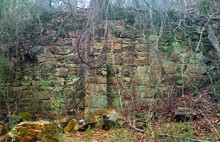

[…] (To be continued) […]
Billy Barnett
Yeah, they went to Brazil, and took their slaves with them, upon assurances from Brazil that they could still work them in new cotton fields. I can’t see how this story advances a positive view of Masons.
If what you say is correct, and I don’t doubt it. It is not something to celebrate. It is just history.
I am not disagreeing but I read nothing about slaves
Their slaves had already been emancipated. It was AFTER the Civil War was over that the emigration began, so they took no slaves with them. Yes, slavery was still legal in Brazil. However, only a very few of the Southern emigrants took part in it and Brazil outlawed slavery altogether in the 1880s. Most of the Southerners who settled in Brazil did so because of the oppressiveness of Reconstruction and because they had lost everything in the war.
Brazil was encouraging Southerners to settle there because of their agricultural expertise. Until the arrival of the Confederados, Brazil was barely able to feed itself because of antiquated agricultural methods.
Before you go spouting off, Mike, link where you get you “facts”…
This is just a story not a political agenda.
This is just a story not a political agenda.
Hey, Russell, educate your own damn self, I didn’t take you to raise and teach.
James, it is well known that the Colonel took over 100 slaves. You are wrong.
What’s your reference?
What year was the Emancipation Proclamation signed and what year did the war end?
James, if you believe all the slaves were freed when the slave owners heard about the Emancipation Proclamation, you must be hopelessly naive. You can stop demanding “references”. I will not assist you in finding truth that you will probably ignore. I hope you enjoy being an apologist for antebellum evil. I myself prefer to look at history as something that can be learned from instead of twisted to match my narrative.
Ok. Mike, I’m a historian. I have degrees in American history from the State University of New York at Albany and from Indiana University at Bloomington. I took advanced courses in American history at the Naval War College and the University of Maryland. Hardly what you would call schools with Southern leanings. No where in any reference book does it state that any Southerner emigrated to Brazil during the war. After the war, Northerners were in control of virtually all Southern ports and the idea that they would allow ANYTHING as nefarious as what you suggest borders on lunacy and is against the historical record.
FURTHERMORE, slaves were far cheaper to purchase in Brazil than they ever were in the antebellum South. But what is so damning to your premise is that out of possibly as many as 20,000 Southern émigrés, only four families purchased a grand total of 66 slaves in Brazil between the years 1867 and 1878. None of the four families was named Norris. By the way, I have references. If you’re not too pig headed to read them.
As to your attack on Free Masonry, there was never any attempt by Masons in either Brazil or the post war South to immigrate on the sole basis that slavery was still legal in Brazil. Yes, I’m sure that it appealed to some. But as stated before, the vast majority of the South was in ruins. Most Southerners, including the former slaveholding class, were dead broke. They could barely afford to feed themselves much less former slaves. All but a handful of the Southerners who left for Brazil were advanced the fee for passage and a small stipend to establish themselves once they arrived by the Brazilian government. THEY COULDN’T EVEN AFFORD TO PAY THEIR OWN PASSAGE.
Additionally, Colonel Norris and his son Robert arrived in São Paulo in December of 1865 by themselves, fully eight months after the war was over. That is if you follow the common misconception that the end of hostilities ended with Lee’s surrender at Appomattox. What happened to the 100 slaves you mentioned? Did they drown at sea? Were they eaten by cannibals?
Masonry is an old fraternal order that not only benefits its members but humanity as a whole. Think… Shriner’s Hospitals for Children. Here in Alabama, another charitable business they ran was the Masonic shoe bank. It ensured that every child in the State had at least one decent pair of shoes, regardless of race, color or creed.
I do not need to twist history to match a narrative. I’m not an apologist for anything. I abhor the thought of one man holding another in bondage. I read history as a continuous, systematic narrative of past events. I’m well educated enough to take my references from multiple sources and determine what is true based on commonality of ideas not based on opinion but of established fact.
There is a lot of historical material out there to read. It’s quite interesting and illuminating. Try it sometime. 🙂
… And Brazil wanted to know how to grow cotton because the south was in ruins. Fronting passage was an economic investment for them. But on the topic of slavery, it was only abolished in the states in rebellion. Some states continued to have slavery until December of 1865 when the states ratified the 13th Amendment.
Very true. Maryland, Delaware, part of Kentucky and Missouri. It was virtually eliminated even in those areas by the close of the war. Those states, with the possible exception of Kentucky due to the production of tobacco, constituted a small percentage of the overall slave population. Even tho slavery was still technically legal in those areas most black males fled after the proclamation and ventured further north to enter black regiments.
One of the things I’ve always found ironic about the Emancipation Proclamation is the fact that you stated, Linor. It only affected slavery in areas in open rebellion. Lincoln was smart in that it effectively ended any hope the South had of intervention by Britain or France. On the other hand, he didn’t want to offend slaveholders in the Border States and risk them throwing their lot in with the Confederacy.
Y’all have fun with this. I’ve expended far too much energy on it. 🙂
Very interesting. Never knew this
Alan Moody
Let’s see the facts Mike..
Too slow to do your own research? Google is free and only takes a finger…
see the above.Nice to see you here my man.
Facts?!? He don’t need no stinking facts!
This story was featured on Sixty Minutes several years ago interviewing the descendants of these settlers in Brazil. Quite interesting.
This story was featured on Sixty Minutes several years ago interviewing the descendants of these settlers in Brazil. Quite interesting.
War of Northern aggression seemed to cause many to resettle in Brazil.. https://en.m.wikipedia.org/wiki/Americans_in_Brazil
So the true racist left here, so why is it still our fault?
About southern slave holders in Brazil: “Although a number of historians state that the existence of slavery was an appeal, Alcides Gussi, an independent researcher of State University of Campinas, found that only four families owned a total of 66 slaves from 1868 to 1875.[citation needed] Most of the immigrants were from the states of Alabama, Texas, Louisiana, Mississippi, Georgia, and South Carolina.” wikipedia
Very interesting reading, it showed me the power of the Masons at that time. Very interesting.
William Hutchinson Norris is my ancestor. He brought no slaves with him to Brazil, but as far as I know he bought two people here and i felt like vomiting when i knew about that, and even though he treated them well and taught them how to speak english, i should say that Slavership is an invention of the Devil
ABC 33/40 had a segment on the Condederados several years ago including interviews with descendants. I
[…] (To be continued) […]
The Treaty of Utrecht was hard on anyone in the United States and made all non- Native Americans deportables.
Taylor Giddiens